SWEDISH
SOUTH ASIAN STUDIES NETWORK
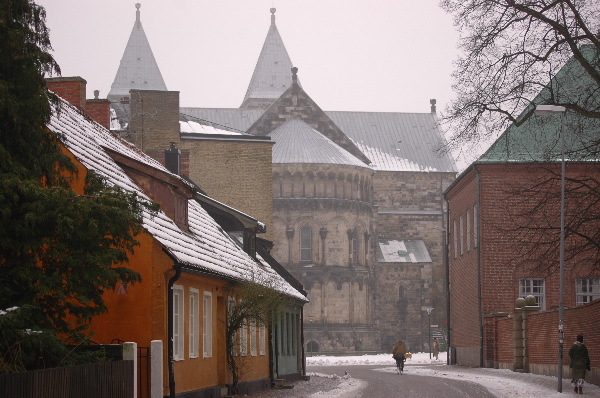 Newsletter
49:
Newsletter
49:
21 February 2005
| SASNET News | |
| Conferences and courses |
Cultural activities |
| New and updated information to the web site |
|
SASNET News:
• Planning grants to eight projects
Eight projects were selected by the reference group in the latest
round of SASNET Planning grants. A total number of 22 applications had
been delivered for consideration in the second round of 2004. On Tuesday
15 February 2005 the SASNET Reference group (consisting of three eminent
Nordic South Asia scholars) decided to give grants to six research projects/programmes
and two related to educational projects. The total amount distributed
was 450 000 SEK. More information on the six
projects.
• Apply for SASNET Planning grants
Applications for the next round of SASNET planning grants are now
invited. Closing date for applications is 15 June 2005. More
information.
• Evaluation of SASNET under way
A self-evaluation of SASNET is now under way. The root node staff,
assisted by the board, documents the networking and other activities that
SASNET has carried out since the start in January 2001. It includes a
follow-up study of the 56 planning grants distributed so far – see
the planning grants follow-up report. This self-evaluation will be
followed by an external expert evaluation during April – June 2005,
when a team of three eminent scholars will visit the SASNET root node
at Lund; Sida/SAREC and the Foreign Ministry in Stockholm, and whichever
SASNET partners they would like to meet with (the universities of Uppsala,
Karlstad, Göteborg, etc.).
The evaluation group consists of Prof. Ghanshyam Shah, Political Scientist
from Ahmedabad, India; Prof. Carla Risseeuw, Dept. of Anthropology and
Development Sociology, University of Leiden, The Netherlands; and Mr.
Lennart Wohlgemut, Director of the Nordic Africa Institute in Uppsala
(suggested to be the team leader). A joint consultation between SASNET
personnel, external experts, Lund University and Sida SAREC should then
take place in June 2005, before a final report will be submitted to SASNET,
Sida/SAREC and Lund University. The report will be the basis for SASNET’s
application for renewed funding from Sida/SAREC and Lund University for
the period 2006–2008.
• SASNET board meeting on 15 February
2005
The SASNET Board met on Tuesday 15 February 2005, discussed
the ongoing self-evaluation, approved of eight new planning grants, and
decided about the budget for 2005. Besides praising the Internet gateway
the board strongly emphasised the priority SASNET should set to reserve
half of its budget for distribution of planning grants. The planned contact
journey to South Asia should be accommodated within a revised budget.
Bandladesh was suggested as one of the countries to be visited. The full
minutes of the meeting will soon be made public on this site.
• SASNET lecture on the Criminalization
of Politics in Bangladesh
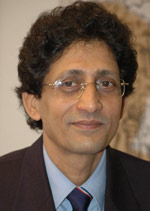 The
Professor of Economics at Dhaka University Abul Barkat gives a SASNET
lecture at Lund University on Tuesday 15 March 2005, 15–17.
Abul Barkat, respected researcher and much engaged in development
issues and the public debate on human rights and politics in Bangladesh,
will lecture on the ”Criminalization of Politics in Bangladesh”.
Barkat comes to Sweden to participate in a workshop on ”Globalization
and Health” organised by Health Economics Division at the Dept.
of Community Medicine, Lund University (in Malmö) 16–17 March
2005). Venue for the SASNET lecture: Conference room 1, Dept. of Sociology,
Paradisgatan, Lund.
The
Professor of Economics at Dhaka University Abul Barkat gives a SASNET
lecture at Lund University on Tuesday 15 March 2005, 15–17.
Abul Barkat, respected researcher and much engaged in development
issues and the public debate on human rights and politics in Bangladesh,
will lecture on the ”Criminalization of Politics in Bangladesh”.
Barkat comes to Sweden to participate in a workshop on ”Globalization
and Health” organised by Health Economics Division at the Dept.
of Community Medicine, Lund University (in Malmö) 16–17 March
2005). Venue for the SASNET lecture: Conference room 1, Dept. of Sociology,
Paradisgatan, Lund.
• Doctoral dissertation
on young middle-class men in New Delhi
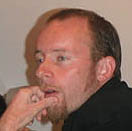 Paolo
Favero, Dept. of Social Anthropology, Stockholm University, defends his
doctoral dissertation on ”India dreams: Cultural identity among
young middle-class men in New Delhi” on Friday 25 February
2005, 10.00. The thesis focuses on the dynamics of social mobility and
cultural change among young middle-class men in contemporary urban India,
and is is part of a major research project at the department on ”Modernities
in transition: A Study of Youth Cultures in Iran, Brazil and India”.
Faculty opponent will be Marcus Banks, Institute of Social and Cultural
Anthropology, University of Oxford, UK. Venue: Reinholdsalen, Juristernas
Hus, Frescati, Stockholm University. In addition to the doctoral dissertation
a documentary film called ”Fly over Delhi” has been
produced by Paolo Favero and Angelo Fontana. The film was shown during
the conference on ”Structures of Vulnerability: Mobilisation
and Resistance” that the department organised 12–14 January
2005 – see below. More information
on the thesis, with abstract.
Paolo
Favero, Dept. of Social Anthropology, Stockholm University, defends his
doctoral dissertation on ”India dreams: Cultural identity among
young middle-class men in New Delhi” on Friday 25 February
2005, 10.00. The thesis focuses on the dynamics of social mobility and
cultural change among young middle-class men in contemporary urban India,
and is is part of a major research project at the department on ”Modernities
in transition: A Study of Youth Cultures in Iran, Brazil and India”.
Faculty opponent will be Marcus Banks, Institute of Social and Cultural
Anthropology, University of Oxford, UK. Venue: Reinholdsalen, Juristernas
Hus, Frescati, Stockholm University. In addition to the doctoral dissertation
a documentary film called ”Fly over Delhi” has been
produced by Paolo Favero and Angelo Fontana. The film was shown during
the conference on ”Structures of Vulnerability: Mobilisation
and Resistance” that the department organised 12–14 January
2005 – see below. More information
on the thesis, with abstract.
• Doctoral dissertation on Pakistani-Norwegian
Funeral Rites
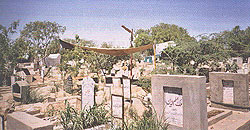 Cora
Alexa Døving, Department of Culture Studies, University of Oslo,
defended her doctoral dissertation on ”Pakistani-Norwegian Funeral
Rites – A Study of Migration”, on Friday 11 February 2005.
The thesis deals with the creation and re-establishment of burial practices
amongst Pakistanis in Oslo.
Cora
Alexa Døving, Department of Culture Studies, University of Oslo,
defended her doctoral dissertation on ”Pakistani-Norwegian Funeral
Rites – A Study of Migration”, on Friday 11 February 2005.
The thesis deals with the creation and re-establishment of burial practices
amongst Pakistanis in Oslo.
It focuses partly on the entrepreneurs, mainly as leaders of different
welfare organisations, who have established a large contact network both
in the Pakistaniani milieu, and also with different Norwegian institutions
who are involved with various aspects of death. First opponent was Associate
Professor Barbro Blehr, Dept. of Ethnology, Stockholm University. More
information (in Norwegian only).
• Nordic Konfucius Institute for Chinese
language studies inaugurated in Stockholm
A Nordic Konfucius Institute for Chinese language and cultural studies
was inaugurated at Stockholm University on Friday 18 February 2005,
14.00-16.30. It is part of an extensive setting up by the Chinese
government of 100 similar centres all over the World. A formal agreement
was recently signed between Kåre Bremer, vice-chancellor of Stockholm
University, and Yan Meihua, Director for China National Office for Teaching
Chinese as a Foreign Language (NOCFL) in Beijing. Half the budget for
teaching, seminars and cultural activities will be covered by NOCFL. The
Konfucius Institute will be connected to Stockholm University’s
Dept. of Oriental Languages. Venue for the inauguration: Main hall, House
4, Kräftriket. More information (pdf-file,
only in Swedish)
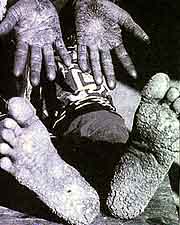 •
KTH releases book on Arsenic contamination of groundwater
•
KTH releases book on Arsenic contamination of groundwater
A new book on “Natural Arsenic in Groundwater: Occurrence,
Remediation and Management” has just been published by Taylor &
Francis. The book features chapters on the Arsenic contamination
of groundwater in Bangladesh and India, and is edited by Prosun Bhattacharya,
Associate Professor of Groundwater Chemistry (Dept. of Land and Water
Resources Engineering, Royal Institute of Technology (KTH), Stockholm),
in collaboration with Jochen Bundschuh and D. Chandrashekharam. The book
will be officially released at a function at the Royal Institute of Technology
in connection with an India evening at KTH in Stockholm on 16 March 2005.
More information on the book project.
• Applications for research Training
Programme in Kolkata invited
The Indian Centre for Studies in Social Sciences, Kolkata,
invites applications for its research Training Programme in History,
Economics, Political Science, Geography, Sociology, Social Anthropology
and Cultural studies. The programme, funded by The South-South exchange
programme for research on the history of development (SEPHIS), will run
from August 2005 to June 2006 and is meant for research students in India
and the countries of the South in the early stages of their doctoral
work. Last date for applications from international participants is 31
March 2005 and for students from India 15 June 2005.
• Academic research papers easily accessible
with Google Scholar
Academic research papers online are now easily accessible with
Google Scholar. This additional service was introduced by the World’s
leading search engine Google in January 2005. Specific searches for scholarly
literature, including peer-reviewed papers, theses, books, preprints,
abstracts and technical reports, are now made possible. Google Scholar
also automatically analyzes and extracts citations and presents them as
separate results, even if the documents they refer to are not online.
This means the search results may include citations of older works and
seminal articles that appear only in books or other offline publications.
Go to Google Scholar.
• NORFACE invites for applications for
Research Seminar Scheme 2005
NORFACE, a partnership between seven European research councils,
now invites for applications for its Research Seminar Scheme 2005. NORFACE
that has an ambition to increase co-operation in research and research
policy in Europe, consists of the research councils from Denmark, Finland,
Iceland, Ireland, Norway, Sweden and the United Kingdom. The objectives
of the seminar series competition should be to improve cross-border collaboration
in the existing areas of strength and excellence, promote areas of new
emerging research, and include young researchers in order to improve their
opportunities for cross-border collaboration between researchers.
Two themes have been identified by the NORFACE Network Board for the first
year, they are: • Science Policy and Science in Society; and •
Security Challenges (including Terrorism). Deadline for submission of
applications: 1 April 2005. Invitations for applications within other
themes will be given in 2006 and 2007.
• Doctoral Research studentships on
Jain studies at the University of Heidelberg
The South Asia Institute at University of Heildelberg offers
two fully-funded Doctoral Research studentships beginning from April 2005.
The research project is within the field of South Asian History/Indology
& Jainism/Anthropology, and the studentships are to be offered as
part of an interdisciplinary research group funded through the Emmy Noether-Programme
of the German Research Association. The project, coordinated and headed
by Dr. Julia A. B. Hegewald, deals with Jainism in Karnataka: A Study
of its Architecture, History and Religion. Closing date for applications
is 28 February 2005. More
information.
• NIAS Contact Scholarships for Nordic Graduate
Students
The Nordic Institute for Asian Studies offer scholarships designed
to make NIAS‚ library and other resources accessible to graduate
students in the Nordic countries. A scholarship covers inexpensive travel
to and from Copenhagen and accommodation in a NIAS room at Nordisk Kollegium,
with full board for a period of two weeks. It must be noted that because
only one room at the Nordisk Kollegium is available for this scholarship
programme, stays are arranged subject to a time schedule administered
by NIAS. Monday 4 April 2004 is the closing date for applications for
scholarships during the period May–August 2005. More
information.
• NIAS Guest Researcher Scholarships
Senior researchers and postgraduate students based in the Nordic countries
are offered scholarships, giving an opportunity to work at NIAS as an
affiliated researcher for 2 or 4 weeks. A scholarship includes inexpensive
travel to and from Copenhagen and accommodation with full board in a NIAS
room at Nordisk Kollegium. The guest researcher enjoys full access to
the Institute’s library services and research tools, computer facilities,
contact networks and scholarly environment. Monday 4 April 2004 is the
closing date for applications for scholarships during the period May–August
2005. More information.
• European Master
of Science Programme in International Health at Karolinska
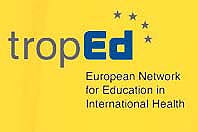 The
Division of International Health, Department of Public Health
Sciences at Karolinska Institutet Medical University is one of eight
European institutions awarding degrees in a new European Master
of Science International Health Degree Programme. The programme
is part of tropEd, a network of European institutions for higher
education, in existence since 1996 and collaborating closely with
institutions in Asia, Africa, and the Americas in providing postgraduate
education and training opportunities. The European Master of Science
Programme in International Health is a one year, full-time study
programme taught in English. The main objective of the programme
is to raise awareness of current global health concerns. Students
become qualified to identify and critically analyse key factors
shaping the health and well-being of populations in low- and middle-income
countries and to formulate effective and appropriate responses to
complex health-related issues.
The
Division of International Health, Department of Public Health
Sciences at Karolinska Institutet Medical University is one of eight
European institutions awarding degrees in a new European Master
of Science International Health Degree Programme. The programme
is part of tropEd, a network of European institutions for higher
education, in existence since 1996 and collaborating closely with
institutions in Asia, Africa, and the Americas in providing postgraduate
education and training opportunities. The European Master of Science
Programme in International Health is a one year, full-time study
programme taught in English. The main objective of the programme
is to raise awareness of current global health concerns. Students
become qualified to identify and critically analyse key factors
shaping the health and well-being of populations in low- and middle-income
countries and to formulate effective and appropriate responses to
complex health-related issues.
Six possible study tracks are offered for this degree and reflect
the strengths of the consortium institutions: Tropical Medicine
and Disease Control; Health Systems, Health Policy and Management;
Sexual and Reproductive Health; Child Health; Health Research Methods;
and Health in Emergencies. Each study track begins with a 3 month
core course from September to December. Core courses provide a common
basis of the main subject areas for all students. Students receive
20 European Credit Transfer System (ECTS) credit points upon successful
completion of their core course.
More information on the European Master of Science International
Health Degree Programme.
• Asian Studies at the
University of Oslo
– The Faculty of Arts at the University of Oslo offers a variety
of programmes in South Asia related Studies. The Institute
for Cultural Studies and Oriental Languages offers courses in
three South Asian languages: Hindi, Sanskrit, and Urdu.
– The Institute
for Archaeology, Conservation and Historical Studies offers
courses in South Asian Studies, covering topics as modern history,
religion and political anthropology, with a focus on India, Bangladesh,
Pakistan, and Sri Lanka, and with a thematic focus on the emergence
of nationalism and ethnic conflict in South Asia, e g courses on
”State, Politics and Culture in 20th Century South Asia”,
and ”Kings, Gods and Temples in Pre-Colonial South Asia”.
Bachelors and Masters Programme
in Asian and African studies are offered
by the Institute of East-European and Oriental Studies. The 3-years
Bachelors programme is divided into four tracks, where one is specialised
on South Asian studies. The students may choose courses from the
wide range of individual University of Oslo courses that already
exist in the field – those connected to South Asia shown above.
After a bachelors degree it is possible to continue with a 2-years
Masters programme in South Asian studies.
Other important institutions
in Norway regarding South Asian studies/development studies:
– Development
studies at Centre for Multicultural and International Studies,
Oslo University College.
– Centre for Development
and the Environment (SUM - Senter for utvikling og miljø),
research institution formally under the University of Oslo.
– Chr. Michelsen Institute
(CMI) in Bergen. One of the largest and oldest independent institutions
in Northern Europe for social science research and advisory work
on development and human rights issues in developing countries.
– International Peace Research
Institute, Oslo (PRIO). Conducts research within three main
themes: Conditions of War and Peace, Ethnic and Nationalist Conflicts,
and Foreign and Security Policies. The institute also publishes
a book series and two journals.
– Agricultural University
of Norway (Noragric), has a resource management programme in
cooperation with the Aga Khan Rural Support Programme in Northern
Pakistan.
• Bangladesh Students'
Association in Sweden
Bangladesh Students' Association in Sweden runs a web site serving
as a common lounge for the bangladeshi student community living
in the country. The association, based at Solna outside Stockholm,
was founded in 1992.
• Bangladeshi celebration
of International Mother Language Day in Stockholm
The International Mother Language Day Celebration Committee
in Sweden organises a two-days programme on 19 and 21 February 2005.
A seminar on ”Ekushe” – the language
movement in Bangladesh duiring the 1940’s and 50’s –
will be held on Saturday 19 February at Husby Träff in Kista,
north of Stockholm, starting at 17.30. The Bangladeshi ambassador
to Sweden, Sabih Uddin Ahmad, will lecture, along with two invited
speakers from London, Abdul Gaffar Chowdhury and Motahar Hossain
Bhuyan. The International Mother Language Day was proclaimed by
UNESCO in November 1999, and is observed all over the World every february
since then to promote linguistic and cultural diversity and
multilingualism.
The celebration continues on Monday 21 February at 11.00 with the
raising of a temporary monument at Sergels Torg in central Stockholm,
in honour of the 1952 martyrs of the Bangladeshi language movement.
For more information contact Selim
Sarwar.
• Oslo seminar on
the Social and Political Impacts of the Tsunami in Sri Lanka
A seminar on the Social and Political Impacts of the Tsunami
in Sri Lanka is held at Oslo University on Tuesday 22 February 2005,
10.15–12.00. The seminar is arranged by the Departments of
Sociology and Human Geography. Venue: University of Oslo, Undervisningsrom
3, Georg Sverdrup Building (Main Library). Professor P. Balasundarampillai
from the Department of Geography, University of Jaffna, will speak
on ”Social Impacts of the Tsunami in Northeast Sri Lanka”;
Professor N. Shanmugaratnam, Norwegian University of Life Sciences,
will speak on the ”Spectre of a 'Second Tsunami' in Sri
Lanka: What Can We Do to Prevent a Human-made Disaster?”;
and Professor Kristian Stokke, University of Oslo, will speak on
”From Disaster Relief to Peace in Sri Lanka?”.
More information fron Kristian
Stokke.
• Stockholm University
lecture on Recent Trends in Nepal
Katak B Malla from the Dept. of Law, Stockholm University,
lectures on ”Recent Trends in Nepal” in Stockholm on
Wednesday 23 February 2005, 15–17. The lecture is organised
by part Stockholm university’s Center for Pacific Asia Studies
(CPAS), and is part of its regular Wednesday lectures series. Venue:
Department of Oriental Languages, Main hall, Kräftriket 4.
• Stockholm lecture
on the the Tsunami floodwave in Asia
Katarina Zinn from the Swedish International Development
Cooperation Agency, SIDA, lectures on the the ”Tsunami floodwave
in Asia”, on Wednesday 2 March 2005, 13–15. The lecture
is organised by part Stockholm university’s Center for Pacific
Asia Studies (CPAS), and is part of its regular Wednesday lectures
series. Venue: Department of Oriental Languages, Main hall, Kräftriket
4.
• The Stockholm Museum of Ethnography arranges a lecture on ”Vishnu and his avatars” on Wednesday 2 March 2005, 18.00. The lecturer is Adèle Schreiber, Bachelor of Arts in Art History, and author of a new book on the Hindu Pantheon of Gods, ”Den hinduiska gudavärlden”. Her starting point will be a number of 19th century glass paintings with Hindu motifs that the museum keep. Venue: Etnografiska Musee, Djurgårdsbrunnsvägen 34, Stockholm. More information.
• Stockholm seminar
on ”Beijing+10 and beyond – Third world experiences
A research seminar on ”Beijing+10 and Beyond –
Experiences from Africa, Asia and Latin America” is organised
by the Dept. of Political Science and the Institute of Latin American
Studies at Stockholm University on Friday 4 March 2005, 9.30–12.30.
Kumud Sharma from the Centre for Women's Development Studies, New
Delhi, India, is one of the keynote speakers. She will lecture on
”Representational Politics and the Politics of Gender Justice”.
Venue: Library of the Institute for Latin American Studies, Frescati,
House B, floor 5, Stockholm.
• Seminar
on traditional Bengali Theatre, Culture and Music
A public seminar on ”Traditional Bengali Theatre,
Culture and Music” will be held in Huddinge, south of Stockholm,
on Thursday 10 March, 19.00. Ten folk musicians, dancers and singers
from Purulia, in the western part of the Indian state of West Bengal,
on tour to Sweden, will take part in the seminar that is organised
by Associate Professor Christina Nygren, Dept. of Musicology and
Theatre Studies, Stockholm University. She is presently completing
an extensive research project on popular forms of theatre in Bangladesh
and West Bengal. Venue: Tonsalen, Slava Theatre, Kyrkogårdsgatan
2, Huddinge. More information on the Purulia
artits’ visit to Sweden.
• Lund lecture on
Development in Bangladesh by Professor Abul Barkat
Professor Abul Barkat from the University of Dhaka, Bangladesh,
lectures on ”The Right to Development & Human Decelopment”
in Lund on Tuesday 15 March 2005, 19.30. The lecture
is jointly organised by SASNET and the Swallows India-Bangladesh
section in Lund, and follows the SASNET lecture Barkat holds at
Lund University earlier the same day (see above). Barkat will discuss
the development assistance Bangladesh has received over the years
– 40 Billion US dollars since 1971. ”Has this helped
Bangladesh”, Barkat asks, and gives the answer himself: ”No,
75 p.c. of the money has been embezzled!”. Besides being a
professor at Dhaka University Barkat is the general secretary for
the Bangladesh Economic Association, an association of 2 500 economists,
and an advisor to the Human Development Research Centre. Venue:
Miljöbiblioteket (The Green Library), Winstrupsgatan 3, Lund.
• India Evening/Book
release party at the Royal Institute of Technology
An India Evening is arranged by the Royal Institute of
Technology, Stockholm, on Wednesday 16 March 2005, 17.00–19.00.
It is also a release party for the book “Natural Arsenic
in Groundwater: Occurrence, Remediation and Management”,
published by Taylor & Francis Group, London. The book, that
features chapters on the Arsenic contamination of ground water in
Bangladesh and India, has been edited by Associate Professor Prosun
Bhattacharya from the Dept. of Land and
Water Resources Engineering, in collaboration with Jochen Bundschuh
and D. Chandrashekharam.
The new Ambassador of India to Sweden, Deepa Gopalan Wadhwa will
be present at the India Evening, and give a speech on ”Challenges
for safe drinking water in India – Achievement of the Millennium
Development Goals”. Venue: Kollegiesalen, KTH, Valhallavägen
79, Stockholm. More information
(as a pdf-file).
• Stockholm lecture
on Development in Bangladesh by Professor Abul Barkat
From Lund/Malmö Professor Abul Barkat travels to
Stockholm and gives the same lecture on ”The Right to
Development & Human Decelopment”, Friday 18 March
2005, 14–16. This lecture is jointly organised by Sida and
Föreningen för SUS-kvinnoprojekt i Bangladesh (SUS). More
information on Barkat – see above. Venue: Sida, Stora hörsalen,
Sveavägen 20. More information
on the lecture to appear on SUS web page.
• Lund workshop on
Sikh and Punjab Studies
A workshop on Sikh and Punjab Studies is held at Lund
University on Saturday 19 March 2005, 9.15–18.00. The workshop,
arranged by the University’s Dept. of History and Anthropology
of Religions in cooperation with the Centre for Sikh and Punjab
Studies at University of California, Santa Barbara, will bring together
a group of scholars from the USA and Europe working in the interdisciplinary
field of Sikh and Punjab studies to discuss various aspects of the
religion, culture and history of Sikhism and the Punjab. It will
be divided into five panel sessions treating the Sikh history, migration
to Europe, the American Sikhs, as well as topics related to identity,
ritual and cultural performances. Venue: Centre for Theology and
Religious Studies, Lund University, Allhelgona Kyrkogata 8, Room
218. More information (as a pdf-file)
• South Asian sociologists meet at conference
in Surajkund
A South Asia Workshop on ”The State of Sociology: Issues
of Relevance and Rigour” is held at Surajkund, south of New Delhi,
India, 23–25 February 2005. The workshop is organised by the Indian
Sociological Society, supported by the International Sociology Association.
The convenor is Professor Ravinder
Kaur, Dept. of Humanities and Social Sciences, Indian Institute of
Technology (IIT), Delhi. The SASNET Director, Prof. Staffan Lindberg,
will participate in the workshop. Full tentative
programme (as a pdf-file)
• Göteborg Conference on Negotiating
Gender Justice
The Centre for Global Gender Studies at PADRIGU, Göteborg
University, Sweden, arranges a conference on ”Negotiating Gender
Justice”, 28 February – 2 March 2005. This conference
focuses on gender relations in countries in the South and aims at exploring
how meanings of gender justice are negotiated at all levels of society,
in parliaments as well as in bedrooms. Out of the 12 guest speakers from
the Third World two are Indian: Dr. Kumud Sharma from the Centre for Women's
Development Studies, Delhi, and V. Geetha Asia College of Journalism,
Chennai.
• Grenå conference on Reconstructing
Post Conflict Societies
The Association of Development Researchers in Denmark (FAU)
holds a conference on “Reconstructing Post Conflict Societies –
Challenges and Possibilities”, at Djursvold Kursuscenter, Grenå,
2–4 March 2005. The conference includes workshops on: ‘Peacebuilding
and Implications for Societies Emerging from Internal Conflict’;
‘Diaspora and Development in Post-conflict Societies’; ‘(Re-)
Development of the Private Sector in Post-war Societies: Opportunities
and Challenges.’: and ‘Reforming State violence – the
Role of Justice System Reform in Post-Conflict Societies’.
• Fourth Annual Regional Meeting of
OneWorld South Asia
OneWorld South Asia holds its Fourth Annual Regional Meeting
3–4 March 2005 in New Delhi, India. The theme for the conference
is ”Towards building Communities of Practice (CoPs) for achieving
the Millennium Development Goals (MDGs)”. 400 delegates from
the South Asian region are expected to take part. The delegates would
include development experts, academicians, practitioners and policy makers.
Venue: India Habitat Centre, Lodhi Road, New Delhi.
• New Delhi Symposium on Tsunami-Science,
Society and Governance
An International Symposium on Tsunami-Science, Society and Governance
is held in New Delhi, India, 5–6 March 2005. Among the participating
organisations at the symposium are found the Geological Survey of India,
UNDP, Oxfam, and Universities in India. Venue: India International Centre,
40 Lodi Estate, New Delhi. More
information.
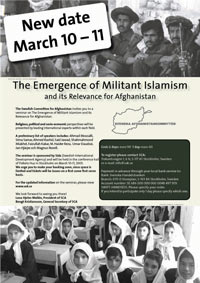 •
Stockholm conference on Militant Islamism in Afghanistan
•
Stockholm conference on Militant Islamism in Afghanistan
An International Seminar on the ”Emergence of Militant
Islamism and its Relevance for Afghanistan” is held in Stockholm
10–11 March 2005. The seminar is arranged by the Swedish Committee
for Afghanistan, with support from Sida. Invited speakers include Professor
Ahmad Moussalli from Beirut, Sima Samar, the journalist Ahmed Rashid,
Gilles Kepel, Professor Jan Hjärpe and Magnus Norell. Some Afghanistan
cabinet ministers and the ambassador in Washington will also take part
in the high-profile conference.
• Kathmandu conference on Nepal Tarai:
Context and Possibilities
A conference on ”Nepal Tarai: Context and Possibilities”
is held in Kathmandu, Nepal, 10–11 March 2005. The conference is
hosted by the Social Science Baha, an organisation set up in January 2002
by people who believed that the study of the social sciences needed to
be encouraged and facilitated in Nepal. Issues to be covered during the
conference, focusing on the southern Tarai region, ranges from development
to environment, from identity and rights to infrastructure and economic
advancement. More
information.
• Jaina Law and the Jaina Community
theme for 7th Jaina Studies Workshop
The 7th Jaina Studies Workshop with the theme ”Jaina Law
and the Jaina Community” is held at University of London, UK, 17–18
March 2005. The workshop is arranged by the Centre of Jaina Studies at
the School of Oriental and African Studies (SOAS) in collaboration with
the Dept. of Indic Religions, Centre for Theology and Religious Studies,
Lund University. On the first day Prof. Phyllis Granoff from Yale University,
USA, will hold the 5th Annual Lecture on Jainism, titled ”Protecting
the Faith: Exploring the Concerns of Jain Monastic Rules”.
More
information.
• Sussex conference in commemoration
of of the Santal Rebellion
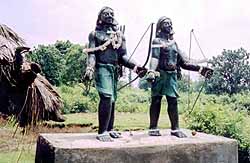 The
University of Sussex organizes a conference on ”Reinterpreting Adivasi
(Indigenous peoples) Movements in South Asia”, 21–23 March
2005. The conference is held in recognition of the 150th anniversary of
the Santal Rebellion in the present state of Jharkhand in eastern India.
It aims at allowing an international reassessment of the role of tribal
movements in the histories of colonial and postcolonial South Asia, and
enable close examination of the construction of indigeneity in many discourses,
from the nation-state to its historiography, and from Hindutva to sub-nationalist
politics. Venue: Graduate Centre in the School of Humanities, and Graduate
Centre in the School of Social Sciences and Cultural Studies, University
of Sussex, UK.
The
University of Sussex organizes a conference on ”Reinterpreting Adivasi
(Indigenous peoples) Movements in South Asia”, 21–23 March
2005. The conference is held in recognition of the 150th anniversary of
the Santal Rebellion in the present state of Jharkhand in eastern India.
It aims at allowing an international reassessment of the role of tribal
movements in the histories of colonial and postcolonial South Asia, and
enable close examination of the construction of indigeneity in many discourses,
from the nation-state to its historiography, and from Hindutva to sub-nationalist
politics. Venue: Graduate Centre in the School of Humanities, and Graduate
Centre in the School of Social Sciences and Cultural Studies, University
of Sussex, UK.
• British Association for South Asian
Studies meet at Leeds
 The
British Association for South Asian Studies (BASAS) organises its 2005
Annual Conference at the University of Leeds, UK, 30 March–1 April
2005. BASAS is the largest UK academic association for the study of India,
Pakistan, Bangladesh, Sri Lanka, Nepal, Bhutan, Maldives and the South
Asian Diaspora. Some of the panels accepted so far: ”Nepali
Identity in the Diaspora”, ”It's shining for some:
an exploration of India's post-liberalisation middle classes”,
”Religion and Politics in Contemporary Pakistan”,
and ”Maritime archaeology and ethnographic approaches in India”.
Professor Staffan Lindberg, Director of SASNET, will take part in the
conference. Last date for registration: 25 February 2005. More
information.
The
British Association for South Asian Studies (BASAS) organises its 2005
Annual Conference at the University of Leeds, UK, 30 March–1 April
2005. BASAS is the largest UK academic association for the study of India,
Pakistan, Bangladesh, Sri Lanka, Nepal, Bhutan, Maldives and the South
Asian Diaspora. Some of the panels accepted so far: ”Nepali
Identity in the Diaspora”, ”It's shining for some:
an exploration of India's post-liberalisation middle classes”,
”Religion and Politics in Contemporary Pakistan”,
and ”Maritime archaeology and ethnographic approaches in India”.
Professor Staffan Lindberg, Director of SASNET, will take part in the
conference. Last date for registration: 25 February 2005. More
information.
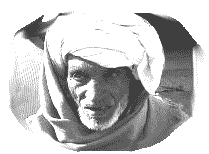 •
Building Alliances and Blurring Boundaries theme for Pakistan Workshop
2005
•
Building Alliances and Blurring Boundaries theme for Pakistan Workshop
2005
The Pakistan Workshop 2005 with the theme ”Building Alliances
and Blurring Boundaries” will be held at Rook How, in the English
Lake District 6–8 May 2005. The focus of the workshop will be on
different types of alliances and those who engages in them. The Pakistan
Workshop has been held regularly in the idyllic country setting of the
Lake District since 1986. It was formed to provide anthropologists and
other social scientist with a venue to meet and discuss ongoing research.
The Workshop has always maintained a relaxed atmosphere for exchanging
ideas and meeting people.
• Oslo conference on Crossroads: Debating
Women's Rights, Racism and Religion
The Nordic Institute for Women’s Studies and Gender Research
at the University of Oslo arranges a conference on ”Crossroads:
Debating Women's Rights, Racism and Religion”, 31 May–1 June
2005. A principal aim of the conference is to initiate dialogue between
minority and majority feminist researchers, and be a forum for discussion
on issues like what anti-racist feminism is, and how solidarity politics
can be expressed? Other themes to be brought up during workshops include
”Gender, Citizenship and Politics” and ”Theorizing
the Diaspora in Literary and Cultural Studies”. Among the keynote
speakers are Uma Narayan, Professor in Philosophy at Vassar College, USA.
Her book ”Dislocating Cultures” discusses Third world
feminism, including different understandings of violence against women.
Venue: Helga Eng's house, at the University of Oslo, Blindern. More
information
 •
Contemporary Dramas of South Asia theme for NASA conference in Aarhus
•
Contemporary Dramas of South Asia theme for NASA conference in Aarhus
After a gap of four years the Nordic Association for South Asian
Studies, NASA, arranges a conference 3–5 June 2005 in Aarhus, Denmark.
The theme for the conference (that normally should be a biannual
event) will be ”Contemporary Dramas of South Asia: Economic, Social,
Political and Cultural Changes/Upheavals”, and it is organised by
the University of Aarhus. The conference includes workshops on
• Globalization, economic changes and socio-political
upheavals; • States and minorities in South Asia;
• Imagining Nations: middle classes and processes of nation
formation in South Asia; • A South Asian security conundrum?;
• Anti-oppressive movements; • Secularism in
South Asia; and • Health, Globalization and Marginalization
in South Asia. Keynote speakers are Dr. Christophe Jaffrelot, director
of the Centre d’Etudes et Recherches Internationales (CERI), Paris;
Professor Zoya Hasan, Centre for Political Studies, Jawarharlal Nehru
University, New Delhi; Professor Martin Sökefeld, Dept. of Anthropology,
Hamburg University; and Professor Isabelle Clark-Deces, Department of
Anthropology, Princeton University. More
information on the NASA conference.
• Michigan conference on Modern Constructions
of the Miraculous and the Mysterious
The Conference on the Study of Religions of India (CSRI) invites
proposals and abstracts for its annual meeting at Albion College, Michigan,
USA, 9–12 June 2005. The conference theme is “Modern Constructions
of the Miraculous and the Mysterious.” Paper proposals should be
submitted to the conference chairman Selva J. Raj no later than February
10, 2005. The Conference on the Study of Religions of India (CSRI) is
a forum of exchange for scholars engaged in the academic study of the
religious traditions of India in both native and diasporic contexts. More
information.
• Helsinki WIDER conference on the Future
of Development Economics
The World Institute for Development Economics Research of the
United Nations University (UNU-WIDER) invites for a Jubilee Conference
on 'WIDER Thinking Ahead: the Future of Development Economics', in Helsinki,
Finland, 17–18 June 2005. Leading International researchers and
policymakers will meet at the conference to mark UNU-WIDER's jubilee anniversary,
and to reflect upon where we now stand in development economics and what
the next two decades might hold. Applications to participate should be
sent before 14 February 2005. More
information.
• Transforming Landscapes of Poverty
theme for Norwegian NFU conference
The Annual Conference of The Norwegian Association for Development
Research (NFU) will be held 20–21 June 2005 on the campus of the
Norwegian University of Life Sciences in Ås close to Oslo. This
year’s conference is a collaboration between NFU and Noragric, the
Department of International Environment and Development Studies at the
Norwegian University of Life Sciences. The theme for the 2005 conference
is ”Transforming Landscapes of Poverty – Resources, Rights
and Conflicts”, and includes panels on ”Landscapes
of Reconstruction in Post-Conflict Societies”, and ”The
poor in space: Location matters for poverty”. More
information.
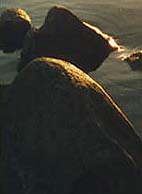 •
800 papers to be presented at Stockholm World Congress of Sociology
•
800 papers to be presented at Stockholm World Congress of Sociology
The 37th World Congress of the
International Institute of Sociology will be held in Stockholm 5–9
July 2005. The Congress will allow social scientists from different parts
of the world to exchange ideas and to establish long-term collaborative
relationships. Its plenary and semi- plenary sessions will focus on the
”Frontiers of Sociology”. Prof.
T.K. Oommen, Jawaharlal Nehru University, New Delhi, India, is one of
the convenors for the semi-plenary session on ”Multiple Modernities
and Social Theory”. There will also be up to 160 regular sessions,
in which up to 800 different papers will be presented. Several panels
focus on South Asian issues. Venue: Stockholm Conference Centre, Norra
Latin, Drottninggatan 71 B. More
information.
The Indian Institute For Sustainable Development And Research
(ISDR) organizes one of the sessions at the 37th World Congress of the
International Institute of Sociology in Stockholm. It is a session called
”New Partnership Between European and Asian Institutes for Socio-Economic-Environmental
Development and Management”, and aims to explore the nature,
role and relevance of the urban development and its impacts both in theory
and in practice in South Asia and in the EU region and to highlight approaches
and methods for improving local environment. For more information contact
the session convenor, Dr. Anand Govind
Bhole.
• Uppsala University arranges third
Balochistan conference
The 3rd international conference on Balochistan with the theme ”Pluralism
in Balochistan” will be held in Uppsala 18–21 August 2005.
Balochistan has throughout history been one of the important meeting points
between the Indian Subcontinent and the Iranian Plateau. Today's Balochistan
is divided between Iran, Afghanistan and Pakistan, and the conference
wants to highlight various aspects of plurality in presentday Balochistan.
Researchers are invited to present papers with a focus on socioeconomic,
religious, linguistic, literary and cultural plurality in Balochistan.
The conference is organised by the Iranian Studies division at the Department
of Linguistics and Philology, Uppsala University. More
information (as a pdf-file)
• Drainage Basin Management theme for
2005 World Water Week
The 2005 World Water Week will take place in Stockholm, Sweden,
21–27 August. The annual World Water Week in Stockholm
has become a valuable meeting point and platform for the world’s
water community, and includes topical plenary sessions and panel debates,
scientific Stockholm Water Symposium workshops, seminars and side events
organised by different international organisations, exhibitions and festive
prize ceremonies honouring excellence in the water field. Usually a large
number of the delegates come from South Asia. Abstracts for presentation
are accepted until 1 February. The overall theme for the 2005 World Water
Week is “Drainage Basin Management. Hard and Soft Solutions in Regional
Development.” More information on on the
World Water Week web site.
• Invitation for Wisconsin-Madison’s
34th Annual Conference on South Asia
The University of Wisconsin-Madison’s 34th Annual Conference
on South Asia will be held 6–9 October 2005. The Conference is sponsored
by the university’s Center for South Asia, and usually attracts
over 500 scholars and other interested parties every year. The 2005 conference
features over 70 academic panels and roundtables as well as association
meetings and special events ranging from performances to film screenings.
More information.
 •
Dhaka conference on Mainstreaming Ageing in Health Systems and Rural Development
•
Dhaka conference on Mainstreaming Ageing in Health Systems and Rural Development
An International Conference on ”Mainstreaming Ageing in
Health Systems and Rural Development” is held in Dhaka, Bangladesh
28–30 November 2005. The conference is organised by the European
Commission-funded PHILL (Primary Health-Care in Later Life: improving
services in Bangladesh and Vietnam) group including the Division
of Geriatric Epidemiology at Karolinska Institutet Medical University.
The other partners in the research consortium are BRAC Research &
Evaluation Division, Health Strategy and Policy Institute (HSPI), Bangladesh;
the Health Strategy and Policy Institute, Vietnam; and the Overseas Development
Group (ODG), University of East Anglia, UK. Venue: Dhaka Hotel Sheraton.
More
information on the conference.
• 11th Himalayan Languages Symposium
to be held in Bangkok
The 11th Himalayan Languages Symposium will be hosted by the
Department of Linguistics, Faculty of Arts, Chulalongkorn University,
Bangkok, Thailand, on 6–9 December 2005. The Himalayan Languages
Symposia (HLS) brings together scholars working on languages and language
communities of the greater Himalayan region, including north-western and
north-eastern India, Nepal, Bhutan, northern Burma, the Tibetan Plateau,
southern China, and Nuristan, Baltistan and the Burushaski-speaking area
in the west. The previous HLS was held in Thimphu, Bhutan, in December
2004. More information will be posted on the conference website: http://pioneer.chula.ac.th/~hkrisada/HLS/
from March 2005.
• Kelaniya University organises 10th
Conference on Sri Lankan Studies
The 10th Conference on Sri Lankan Studies (10th ICSLS) will
be held 16–18 December 2005 at the Kelaniya University, Sri Lanka.
The theme is “Sri Lanka after 500 Years of Western Colonization
and Future Perspectives”, and the conference will be hosted
by the Social Science Research Center of the University of Kelaniya. Deadline
for abstract submission is 30th May 2005. More details are now available
at the Sri
Lanka Studies Network web site.
• First circular for 19th European Conference
of Modern South Asian Studies
The 19th European Conference of Modern South Asian Studies (ECMSAS)
will be held at Leiden University, the Netherlands, 27–30 June 2006.
Panel suggestions are now invited, and should be given before 1 June 2005.
Read the first announcement for the conference
(as a pdf-file)
• Other conferences connected to South Asian
studies arranged all over the World
See SASNET’s page, http://www.sasnet.lu.se/conferences.html#conf
• Bengali folk artists on tour to Sweden
A group of ten folk musicians, dancers and singers from Purulia,
in the western part of the Indian state of West Bengal, visit Sweden in
March. A performance called ”Bengali Night”
featuring suggestive so-called jhumu music and nachni
dance (by Shonda Rani), will be given at Södra Teatern in Stockholm
on Friday 11 March 2005, 20.00. A group of baul singers from
the same region will also take part in the show. The Indian group’s
visit to Sweden is part of a five-year Sida-sponsored project called Voices
of the Children, aimed at strengthening children’s theatre in Asia.
More information on
the performance (under ”program”).
The Purulia folk artists’ tour to Sweden has been initiated by Associate
Professor Christina Nygren, Dept. of Musicology and Theatre Studies, Stockholm
University. She is presently completing an extensive research project
on popular forms of theatre in Bangladesh and West Bengal. More
information on her project. The day before the performance in Strockholm,
on Thursday 10 March 2005, 19.00, she will lead a seminar on ”Traditional
Bengali theatre, culture and music” with the ten artists from
Purulia. The seminar will be held at Tonsalen in the Slava Theatre in
Huddinge, south of Stockholm (Kyrkogårdsvägen 2).
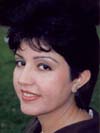 •
Afghani superstar Hangama performs in Stockholm
•
Afghani superstar Hangama performs in Stockholm
The Afghani superstar Hangama gives a concert in Stockholm on
Friday 11 March 2005, 18.30. Hangama firsst appeared on Radio Afghanistan
in 1974 and soon became extremely popular. She fled the country during
the civil war and stayed for 14 years in Germany. She now resides in Canada.
Venue: Folkets Hus (Norra Bantorget, Stockholm.
New and updated items on SASNET web site
• More Swedish departments where research
on South Asia is going on:
Added (and updated) to the list of research environments at Swedish
universities, presented by SASNET. The full list now includes 147 departments.
Go to the presentation page.
ƒ School of Education and Communication, Jönköping University
ƒ SPIDER, Swedish Program for ICT in Developing Regions, Dept. of Computer and Systems Sciences, Royal Institute of Technology (KTH), Stockholm (also based at Stockholm University)
- ƒ Division of Gender and Medicine, Dept. of Molecular and Clinical Medicine; Faculty of Health Sciences, Linköping University
ƒ Division of Operation and Maintenance Engineering, Department of Civil and Environmental Engineering, Luleå University of Technology
ƒ Lund University Centre for Sustainability Studies (LUCSUS) (changed name on 31 December 2004, previously the Centre for Environmental Studies,MICLU)
ƒ National Institute for Working Life, Stockholm
ƒ Dept. of Sociology, Stockholm University
ƒ Dept. of History , Uppsala University
ƒ Dept. of Medical Biochemistry and Microbiology, Uppsala University
Best regards,
Staffan Lindberg Lars Eklund
SASNET/ Swedish South Asian Studies Network
SASNET is a national network for
research, education, and information about South Asia, based at Lund University.
The aim is to encourage and promote an open and dynamic networking process,
in which Swedish researchers co-operate with researchers in South Asia and globally.
The network is open to all sciences. Priority is given to co-operation between
disciplines and across faculties, as well as institutions in the Nordic countries
and in South Asia. The basic idea is that South Asian studies will be most fruitfully
pursued in co-operation between researchers, working in different institutions
with a solid base in their mother disciplines.
The network is financed by Sida (Swedish International
Development Cooperation Agency) and by Lund
University.
Postal address: SASNET – Swedish South Asian Studies Network, Scheelevägen 15 D, S-223 63 Lund, Sweden
Visiting address: Ideon Research Park, House Alfa 1 (first floor, room no. 2042), in the premises of the Centre for East and South East Asian Studies at Lund University (ACE).
Phone: + 46 46 222 73 40
Fax: + 46 46 222 30 41
E-mail: sasnet@sasnet.lu.se
Web site: http://www.sasnet.lu.se
Staff: Staffan Lindberg, director/co-ordinator & Lars Eklund, webmaster/deputy director
SASNET - Swedish South Asian Studies Network/Lund
University
Address: Scheelevägen 15 D, SE-223 70 Lund, Sweden
Phone: +46 46 222 73 40
Webmaster: Lars Eklund
Last updated
2010-11-18
